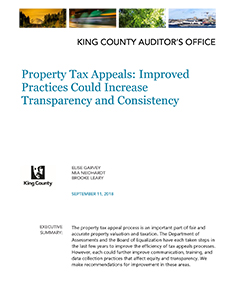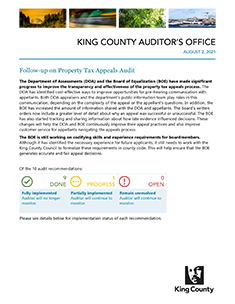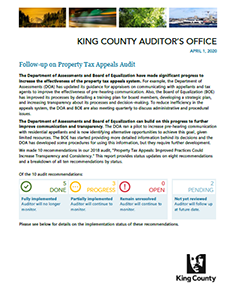Property Tax Appeals: Improved Practices Could Increase Transparency and Consistency
September 11, 2018
NEW! Download the latest follow-up report
The property tax appeal process is an important part of fair and accurate property valuation and taxation. The Department of Assessments and the Board of Equalization have each taken steps in the last few years to improve the efficiency of tax appeals processes. However, each could further improve communication, training, and data collection practices that affect equity and transparency. We make recommendations for improvement in these areas.
Status
Of the 10 recommendations:
| DONE | 9 | Recommendations have been fully implemented. Auditor will no longer monitor. |
|---|---|---|
| PROGRESS | 1 | Recommendations are in progress or partially implemented. Auditor will continue to monitor. |
| OPEN | 0 | Recommendations remain unresolved. Auditor will continue to monitor. |
| CLOSED | 0 | Recommendation is no longer applicable. Auditor will no longer monitor. |
| PENDING | 0 | Not yet resolved. Auditor will follow up at future date. |
Summary
Property taxes are a major source of revenue for King County and for many local governments and taxing districts within its borders. King County makes property valuation and tax exemption decisions that impact property taxes for over 700,000 properties, and property owners can dispute those decisions.
More than 5,000 commercial and residential property owners appeal their property tax valuation every year. King County anticipates that the number of appeals will increase in the next few years, in part due to increases in property taxes.
Across all appeals from 2012-2017, around 40 percent of people who filed an appeal received a reduction in their property valuation and tax bill.
The BOE does not have the structure in place to set its strategic direction and ensure the long-term skills of its members. While the BOE meets state-mandated training requirements, it does not have many opportunities to learn about complex appraisal topics, which could lead to inconsistency in board decisions.
Finally, BOE and DOA efforts to improve administrative coordination related to appeals have been inconsistent. This hinders the transparency of the appeals system for them and for appellants. Better information sharing and more regular administrative coordination between the BOE and DOA would help make sure that both agencies can continue to improve their processes and make the best use of limited general fund resources.
We make ten recommendations to improve the transparency and consistency of the appeals process. These include recommendations to improve communication with appellants, codify skills and experience standards for members of the BOE, increase the amount of information shared about appeal decisions, and clarify how decisions on the acceptance of late evidence are made.
Reports related to this audit
Currently, there are no related reports to this project.
Audit team
Elise Garvey, Mia Neidhardt, and Brooke Leary conducted this audit. If you have any questions or would like more information, please call the King County Auditor's Office at 206-477-1033 or contact us by email KCAO@kingcounty.gov.

 Translate
Translate


